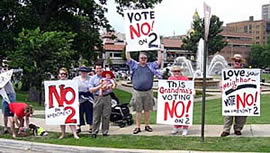A key question in the marriage amendment vote here in Missouri is whether it would have made a difference if the forces aligned against the marriage amendment had used different approaches. Those who fought the amendment acknowledged they did make mistakes, and hoped to learn from Missouri. Those in support of the amendment chortled about it in the press and elsewhere, calling it a mandate for the country. After all, Missouri is the bellwether state, the state at the cross-roads of the country . Where goes Missouri, goes the rest of the nation.
Though I think this is true in the upcoming election where more traditional conservative/liberal alignment comes into play, I don’t think this is true for issues such gay rights–or issues of choice for that matter, either. The reason behind my perspective is Missouri’s unique religious infrastructure.
The following are diary passages from an itinerant Episcopalian preacher who traveled about Missouri in 1836:
March 13th.-Sunday: — Preached in Potosi great seriousness prevailed but no excitement took place.
Monday — In great body weakness I attempted to preach at Bro. Lances on Brush Run, and I do hope that a revival is about to burst forth here.
Thursday. 17th. preached at a house near Bro. Z. Hughes and bless God we had a glorious season. One woman took what used to be called in Tenn. the BARKING EXERCISE. This was something I had never witnessed before and something I am not able to account for on any principal.
Sunday 20th. At Caledonia [Washington County] meeting house had a very nice congregation and some apparent good feeling. Unfortunately this class which numbers more than half a hundred is about to be convulsed to its seats by internal broils. The most influential members are engaged in their disputes.
Wed. 23rd. In the morning I rode 12 miles to the little school house near what is called three forks of Black River [Reynolds County], and at 1 p.m. preached to the blacks as they are numerously [sic] called. Some of the people seemed to be very devoted. All seemed to be exceeding poor in the world’s Goods.
I . . . pursued my round to Bro. Robert Johnson’s the next appointment expecting to find them comfortably circumstanced, but was badly disappointed. . . . I was amazed and chagrined to see the filthy appearance of the sisters and everything else. The beds were ridiculous and the women were foul almost beyond a savage. I was very hungry haven’t eaten anything since morning, but thought this is no place for a hungry and weary traveler.
In reference to “barking exercise” you see the beginnings of the pentecostal faith here in Missouri. You can also begin to the see the foundations for the disparate, though kindred, religious organizations that form the infrastructure that so characterizes this state.
I found these quotes in the online version of OzarksWatch–an interesting publication about life and culture in the Ozark mountain region, which encompasses southern Missouri, northern Arkansas, and bits of Oklahoma and Kansas.
(The site shows publications only up through 2000, but indications are the publication is still active.)
The following was from another article, written in 1988 by Stanley Burgess, a professor of religious studies, where he takes a closer look at religion in the Ozarks:
Ozarks religion in the post Civil War era witnessed increased pluralism because of ethnic and cultural, as well as theological, conflicts. Struggles between conservatism and liberalism have been persistent for a century. Conservatives favor more literal interpretation of Scripture, and the need for spiritual regeneration. Liberals adapt religious ideas to modern culture and modes of thinking, emphasize social action, and approach Scripture historically more than literally. Thus far, conservatism seems to have prevailed.
Though focusing on the Ozarks, Dr. Burgess’ statement could very well demonstrate much of the difficulty gay rights advocates (and pro-choice advocates, and separation of church and state advocates) have had in this country–religious conservatives tend to maintain a fairly static, dominant view of their faith, even within a changing culture; while religious liberals are more willing to adapt their faith to fit modern ideas and concepts. What makes things interesting is that the lines between the two–traditional/conservative and adaptive/liberal–don’t always fall cleanly outside of membership in faiths.
The Catholic Church is an excellent example of a idealistic split between traditional and adaptive church members. The Catholics in the North, east and west, tend to separate some church doctrine from their votes and act accordingly. Because of this, you have people like John Kerry who is Catholic but still supports choice; though he doesn’t support gay marriage, he doesn’t actively not support it, either.
On the other hand, though, you have people like the influential Archbishop Burke from St. Louis, propagating a very traditional Catholic view about applying one’s faith to one’s vote. Though the Catholic Church disagrees with the invasion of Iraq, supports the worker over the corporate, and is against the death penalty, make no mistake that its primary target in US elections is gay rights and procreative choice. So much so that Bush has been actively courting what has been, traditionally, a Democratic voting segment of the populace.
The impact on this state in elections this year is an interesting one. While some Catholics will go so far as to not support Kerry, I believe that most will probably support him, primarily because on issues of gay rights and abortion, he’s not an active supporter of either. He has taken a neutral stance on both, and is maintaining this through the election. Moreso, he refuses to get into dialogs on these issues, which is probably the wisest course for him to take in this election.
No, other factors outside of choice and gay rights, such as the growing backlash against the fighting in Iraq, corporate distrust, strong conservationist viewpoints, as well as the Union membership in this state helps keep the Presidential race on an even split in Missouri – even with people like Ashcroft and Limbaugh being born here.
(Perhaps because others like Truman and Twain were also born here.)

But on votes that separate all other factors out and focus on these two issues, of choice and gay rights, especially when it comes to challenging something so traditional as marriage, the Catholics in Missouri will most likely side with the Church, as will other rural Catholics in the United States. I believe this is represented in the votes cast in the recent marriage amendment ballot, where St. Louis City voted against the amendment, but St. Louis County, which includes my home, voted overwhelmingly for it.
Adding the Catholic vote to the other primarily fundamentalist religions in the rest of the state, the fact that the marriage amendment was passed was a foregone conclusion–especially when those critical of the amendment focused primarily on its being ‘meanspirited’, running ads paid for by out of state money.
(Out of state money and influence is sure to have negative reprecussions in this strongly independent, state; that old saying, “Stubborn as a Missouri Mule” was earned honestly here.)
Both the proponents and opponents of the marriage amendment have said that this election could be an indicator of how the country will react to upcoming elections on this issue. However, this really isn’t born out by the demographics–that unique religious infrastructure I talked about earlier.
Those in favor of gay rights should not be so quick to be discouraged by the Missouri vote. Consider the following about this state:
Due to early Spanish and French influences, Missouri is home to a large, and fairly traditional Catholic population.
Missouri is also home to the fundamentalist Christian movement in this country, with Springfield, Missouri termed the buckle of the bible belt (all due respect to Dr. Burgess’ dislike of this phrase).
The Assembly of God Church, a leading pentacostal (and fundamentalist) church began here in Missouri.
The Baptist Bible Fellowship and the Pentecostal Church of God are also headquartered here.
Several traditional Christian publication houses are headquartered in Missouri.
The Mormons actually engaged in civil war with Missourians in 1838, in a battle called The 1838 Mormon War.
Though not as widespread today, the ties between racism and fundamental Christianity are still reflected in organizations such as the Council of Conservative Citizens – the new face of the KKK in the United States. A group, I am forced to add, that originated here, in St. Louis. This follows on the fact that the Ozarks is home to the Christian Identity Movement.
And I could go on. As Professor Burgess states:
Renowned for the natural beauty of its changing seasons, the Ozarks is clothed as well year-round in a religious coat of many colors. But it is a diversity of color, not of fabric. Nowhere in the United States is religion more central to the life and practices of its people than here. Ozarkers share a commitment to things religious which in large measure provide the community, the education, and the values which make up their everyday lives.
Change “Missouri” for “Ozarks” and you can account for most of the state, except for the tiny pockets of Kansas City and St. Louis, cities too large and disfuse to support any one dominate religious belief. This shows up more readily when you look at a graphic of the vote for the marriage amendment, by county.
(In case you’re wondering about that lighter color in Boone County, in addition to those around St. Louis and Kansas City–Columbia is located in Boone County, and Columbia is home to the University of Missouri.)
Of course, when you look at the history and religious influence in this state, trying to extrapolate from it to the rest of the country as regards voting on issues that come with such strong traditional religious bias, is, frankly, ludicrous. The strong vote in favor of the marriage amendment in this state no more reflects how the rest of the country will vote, then our religious demographic reflects the rest of the country.




